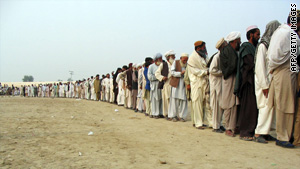Pakistan: Suspected drone strike kills 4

- Official: Strike took place in North Waziristan border region where the Taliban has long operated
- Official says apparent target was the home of "local militant" Musharaf Gul
- Strike is less than 2 weeks after suspected drone strike killed at least 25 in Bajaur, Pakistan
- Pakistani military continues to press its offensive against Taliban in South Waziristan
Islamabad, Pakistan (CNN) -- A suspected drone strike killed at least four people in a mountainous border region where the Taliban has long operated, Pakistani officials said Thursday.
The predawn attack took place in North Waziristan. The apparent target was the home of "local militant" Musharaf Gul, a Pakistani intelligence official said.
It comes less than two weeks after another suspected drone strike killed at least 25, including two relatives of a local Taliban commander in Bajaur, another Pakistani region along the Afghan border.
Meanwhile, the Pakistani military continues to press its offensive against the region of South Waziristan, another Taliban stronghold. The army launched its assault against the hometown of Pakistani Taliban leader Hakimullah Massoud last month. Military spokesmen said this week soldiers were fighting fierce street battles against the militants in the South Waziristan town of Ladha.
 Video: Taliban radio wars
Video: Taliban radio wars
 Video: Rare glimpse into S. Waziristan
Video: Rare glimpse into S. Waziristan
In a phone interview with CNN on Wednesday, a spokesman for the Taliban claimed the militants were making a tactical withdrawal from parts of South Waziristan. The purpose of the move is to conserve resources and wait out the military's advance until the cold weather sets in by January, said Azam Tariq, a Taliban spokesman.
Then, Tariq added, the Taliban will launch a guerrilla war against the Pakistani army in areas beyond South Waziristan.
The spokesman denied military claims that the Taliban had suffered scores of casualties. Instead, Tariq told CNN his fighters killed "more than a thousand" Pakistani security forces.
It is not possible for CNN to confirm these claims. Pakistani authorities have barred foreign observers, humanitarian workers and journalists from traveling to the conflict zone, with the exception of several highly-organized visits provided with military escorts.
More than 160,000 civilians have fled the fighting. Aid organizations are sounding the alarm about untold numbers of civilians who they fear may still be trapped in the conflict zone.
Taliban commanders in Pakistan have communicated with the media in recent months, primarily by telephoning Pakistani reporters working in and around the country's troubled border regions.
The Pakistani army enjoys "cautious" popular support in its battle against the militants, said one of the country's most respected pollsters.
According to a poll released this week by the Gilani Research Foundation, which is the Pakistani affiliate of Gallup International, 51 percent of Pakistanis surveyed said they supported the army's latest offensive against the Taliban.
Thirteen percent of those surveyed opposed the military operation, while the remainder said they were unsure.
However, most Pakistanis polled blamed either the United States (35 percent) or the Pakistani government (31 percent) for the crisis in South Waziristan.
"Only a minority [25 percent] blames the Taliban for what has happened," said Dr. Ijaz Gilani, who organized the poll. "America continues to be seen as a threat. So support for the military operation does not mean a change in attitude towards the United States."
Last week, U.S. Secretary of State Hillary Clinton faced heated criticism from journalists, businessmen and university students during what was supposed to be a three-day charm offensive in Pakistan.
Many Pakistanis blame the United States and its war in neighboring Afghanistan for the violence in Pakistani border regions, and for the wave of deadly bombings that have killed more than 250 people in Pakistani cities over the past month.
The Gilani Research Foundation reports 39 percent of Pakistanis polled believed the conflict in Pakistan is actually America's war. While 37 percent called it "Pakistan's war," and 22 percent said the conflict was in the interest of both Pakistan and the United States. "In my own interpretation, it is 'cautious support' [for the army offensive]," Gilani concluded.
